Wine
Tamber Bey Is a ‘Family Winery in a World of Corporate Giants’
October 6, 2023

Jennifer and Barry Waitte are winemakers and equestrians, and every decision they make is predicated on their dedication to quality and craftsmanship at Tamber Bey.
Tamber Bey was founded in 1999 by Barry Waitte, whose life was forever changed after encountering a bottle of 1974 Beaulieu Vineyard Georges de Latour Private Reserve while studying business at California Polytechnic State University, San Luis Obispo. He went on to forge a successful career at tech giants including Apple and AOL in Silicon Valley, while pursuing his personal passion for wine, and slowly building a serious collection focused on Bordeaux Grand Cru benchmark wines.
But Barry also wanted to create for others the same moment of epiphany and discovery that changed his life, and after two decades of a successful life in the world of tech, he sought out mentorship from growers he’d long admired from afar, including Robert Mondavi, Andy Beckstoffer and Ren Harris.

“I’ve been passionate about wine for many, many years,” Barry explains. “As I learned more and went to wine countries, I always asked myself, ‘Wouldn’t it be cool?’ I decided to pick up all my toys, move here, and make it happen.”
When Barry first moved, he purchased a 60-acre established vineyard in Yountville and an 11-acre property in Oakville, initially focusing just on growing grapes.
“But after a year-and-a-half of just being a grower where I had two vineyards, I decided to make a little bit of wine,” he says. “So I hired a winemaker and we made 150 cases of Cabernet Sauvignon.”
It sold before he’d even bottled it. The next year, he made 300 cases.

“Same thing happened again,” Barry says. “Long story short, we have now grown our brand to about 10,000 cases of wine, and we’ve gone from one wine to 21 wines, all French varietals.”
Waitte now works with vineyard partners in select terroirs of California that he believes best match the flavor and style he wants for each wine.
Barry got into wine, he says, “to focus the rest of my life on something where I can be creative. And to me, growing our portfolio and making new wines every year exemplifies what creativity is.”
That desire to push to the next level resulted in an entire new line of lines dedicated to Pinot Noir.
“We started developing a Pinot Noir series, and buying fruit from Sonoma,” he recalls. “Three different vineyards there. Then, our customers were asking for rosé, so we started looking for a vineyard with Rhône varietals specifically for that. That’s just how the progression has gone, and I’ve gone from two vineyards to sourcing fruit from 11 different vineyards. I am looking for the best possible fruit that is very terroir-driven.”
Barry’s passion for and history working in tech have also helped bring his wine to the next level, he explains, noting that while some producers avoid technological advances, he embraces them.
Instead of sending multiple employees to hand-sort grapes post-harvest and introduce the “possibility of human error, we now use an optical sorter, where every berry is having its picture taken by a digital camera and analyzed for size, color, and condition.”
Subpar fruit is rejected, and the overall quality of every wine is instantly elevated, Barry explains.
“And it goes about two-and-a-half-times faster than our older process,” he adds.
But Barry’s passion for creating life from the land couldn’t be confined just to growing and winemaking.
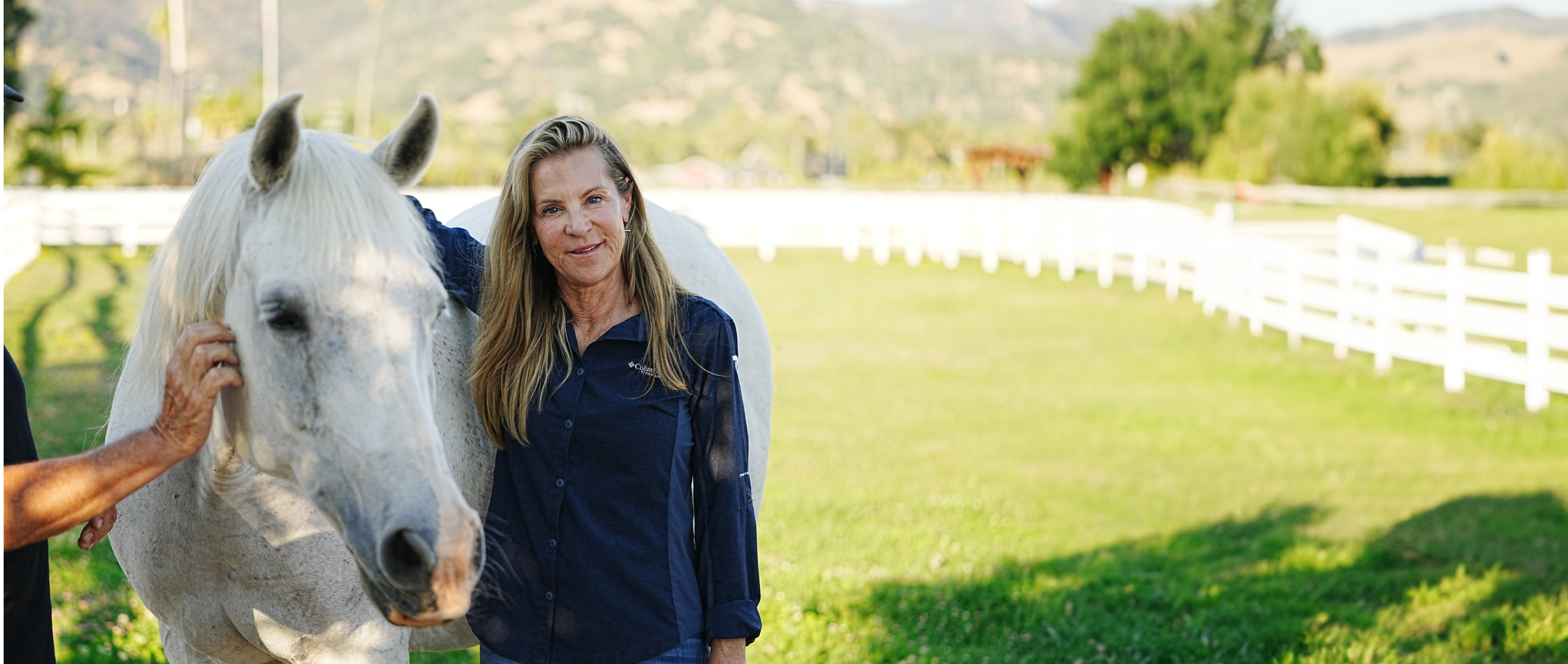
In addition to hosting enviable vines, Tamber Bey HQ is home to more than 20 horses, including performance Arabians, retirees, rescue horses, and miniatures.
Waitte also met his wife Jennifer, an accomplished equestrian, through their shared passion for horses. In 2000, he bought a horse from her; seven years later, they began dating. The rest, as they say, is history.
“Truth be told, I married into the wine business when I got together with Barry,” says Jennifer, who now works as co-proprietor and director of marketing for Tamber Bey. “I slowly got more involved in the wine side, but the horses and wines have always been deeply intertwined at Tamber Bey. The winery itself is located on a 22-acre horse farm with 17 irrigated paddocks, and two arenas.”
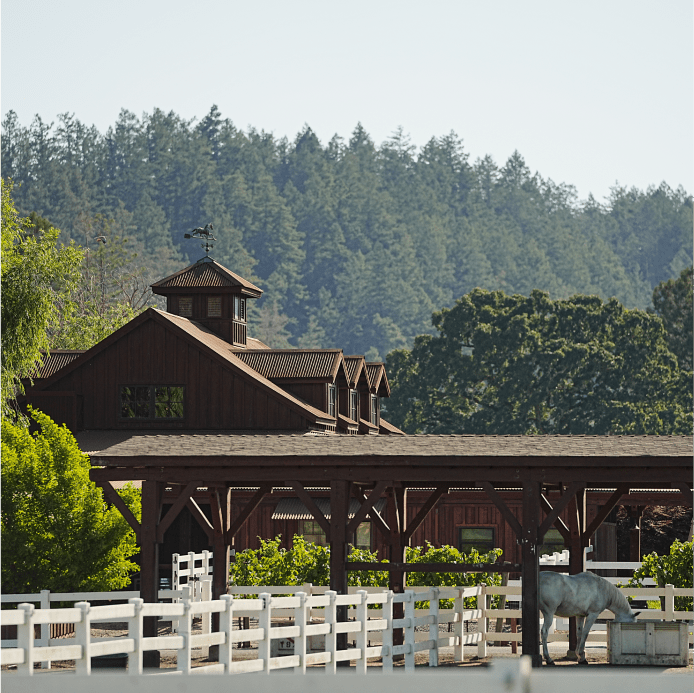
Both Barry and Jennifer compete in endurance horse racing and polo, and both love, she says, “having all of our passions here in one location.” For Barry, endurance racing is a lot like winemaking. "It's a game of patience, of making sure you're doing the right things at the appropriate time. It doesn't make a difference what you do in the middle of a race or where you start, it's only at the finish. And winemaking is the same way. In the sport, the protocol there was to finish is to win, and that's very much what we want to do in the wine business."
The Tamber Bey team’s love of horses is literally written into its name. Tamber Bey is a portmanteau of the nicknames, a.k.a. barn names, of Barry’s first two Arabian endurance horses, Tamborina (Tamber) and Bayamo (Bey). And the name games don’t stop there. Three of their four blends are named after horse color coat patterns: Rabicano, Sabino, and Tovero.
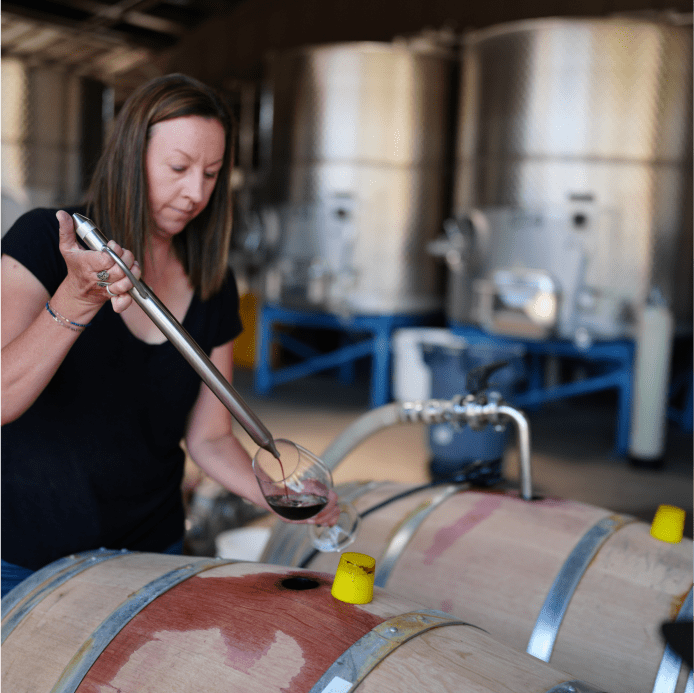
At Tamber Bey there is rarely a spare moment for anything but the task at hand.
A reality, Jennifer explains, of running a tight ship with just family at the helm. Every single barrel, she notes, has “their hands on it. They test and taste every single barrel” before it’s blended and bottled.
That sort of personalization would be impossible in a winery with more than 10,000 cases.
“It’s myself, Barry, and Barry’s daughter Kendra invested in this company on a business and emotional level,” Jennifer explains. “It’s a small company that we’ve grown by our hard work and determination. We live it, we breathe it. It’s a part of us. We live on the vineyard. We are a family company in a world of corporate giants.”
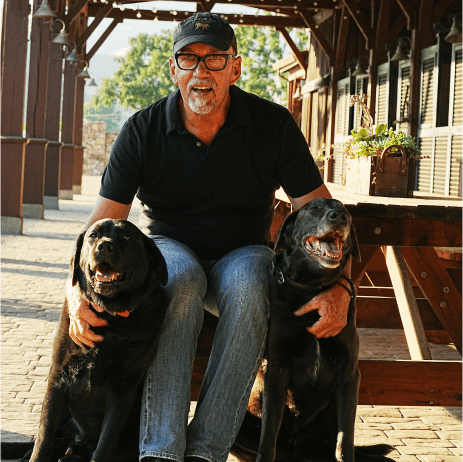
Barry concurs, explaining that full-circle sustainability defines their mission.
“When most people think of sustainability, they think of vineyards, and they think organic,” he says. “All of which is true. But sustainability also means that we are building a business for the long term. I'm thinking of legacy. I'm thinking of my children and my grandchildren being a part of this business. And so everything we do today really does have a 20, 30 potentially even longer window of our decision making.”
The dual mission of being true to their roots, and thinking big while staying small, Jennifer notes, has made partnering with Sommsation a godsend.
“Sommsation has allowed us to reach people on a whole new level,” Jennifer says. “We launched with Sommsation in 2021, and it has been great. We’ve had some great opportunities to have our wines showcased at great venues because of this partnership.”
What’s next? Exciting things in the wine department, because Tamber Bey has welcomed a new winemaker, Sally Johnson Blum. She comes with an impressive resume, including multiple 100-point scores from Robert Parker, a place on Wine Spectator’s Top 100 Wines in the World, previously serving as director winemaking at Robert Mondavi Winery and winemaker at Pride Mountain Vineyards.
“She joined us in March,” Barry says. “It was the find of a lifetime for us as an organization. Her attention to detail and the way she manages not herself but other people is something that is unique.”
Sally’s first wines for Tamber Bey aren’t finished, but they’re in the bottle. Keep your eyes peeled for her 2023’s.
In the meantime, check out a few of Tamber Bey’s other offerings.
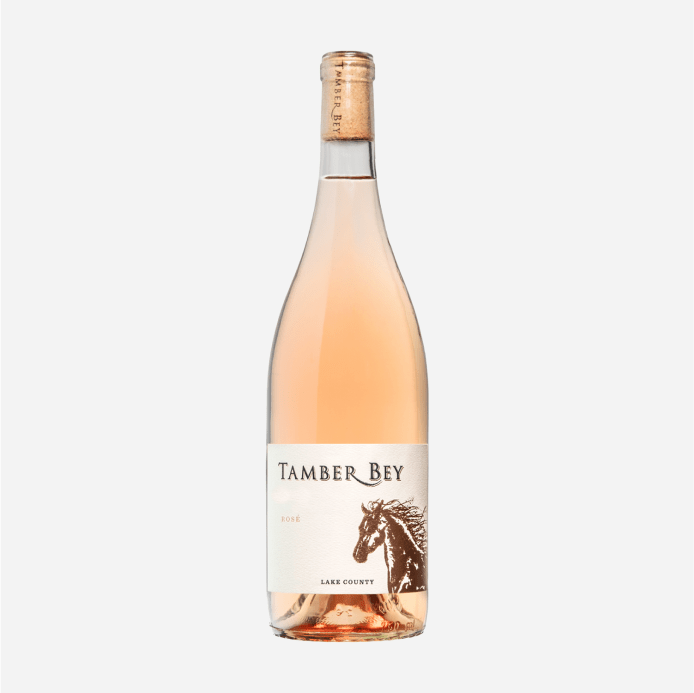
Tamber Bey Vineyards Lake County Rosé, 2022: A luscious Rhone blend of 71% Syrah and 29% Grenache crafted in the true spirit of a Provence-style Rosé. Serve chilled, it is the ultimate summer wine.
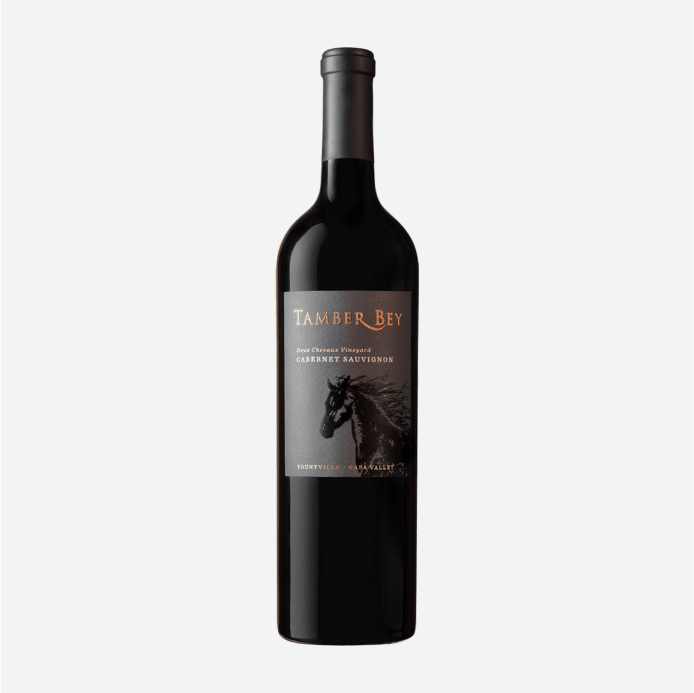
Tamber Bey Vineyards Deux Chevaux Vineyard Cabernet Sauvignon, 2019: Flavors ofof graphite, blackberry, cassis, vanilla bean, crushed rock, blend with a spice mix of clove, nutmeg and allspice.


